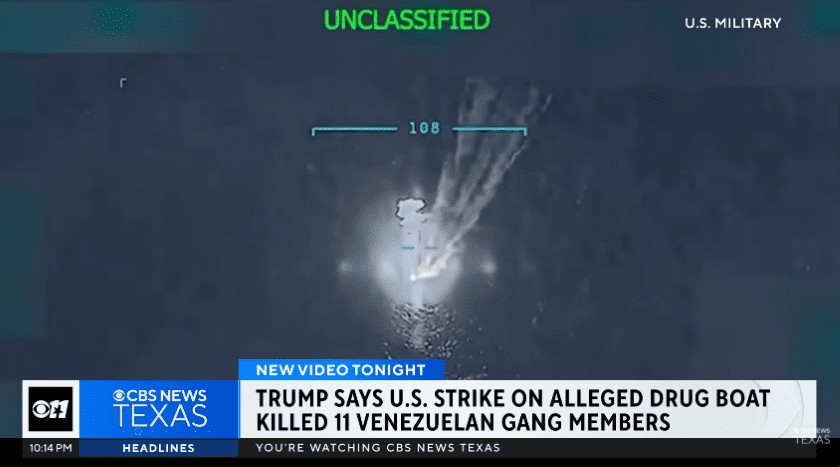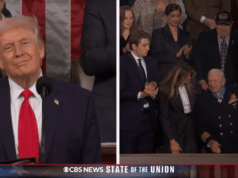A bright flash at sea. A fishing boat gone. Eleven people dead. What the U.S. government calls a strike on a drug-running vessel has become an international row that raises basic questions: what law allowed it, who made the call, and how will the world check a power that can destroy a ship with one order?
President Donald Trump announced the strike and said U.S. forces had destroyed a vessel linked to the Venezuelan gang Tren de Aragua in the southern Caribbean. U.S. officials described the dead as “narco-terrorists.” A video released by the Pentagon shows a blast that obliterated a small craft, but independent details about the target and what intelligence supported the strike remain scarce.
Defense Secretary Pete Hegseth defended the action and drew sharp criticism when he told reporters the U.S. had “absolute and complete authority” to conduct the strike. His comment, repeated on several networks, set off a debate over presidential power and the rules that govern the use of lethal force far from U.S. shores.
Legal experts say the move is unusual. The United States often intercepts suspected drug ships, captures crews, and seizes cargo. Lethal force at sea, especially when civilians may be aboard, raises questions under U.S. law and international law. Some lawmakers warned of dangerous precedent. Senator Rand Paul asked whether the U.S. should act as judge, jury and executioner, while others urged independent review of the intelligence behind the strike.
Regional leaders reacted with alarm. Venezuela called the strike an illegal act and questioned the authenticity of the U.S. video, alleging tampering. Human rights groups and some legal scholars urged an inquiry and even suggested the International Criminal Court should examine the deaths, saying no one is above the law.
Why the uncertainty matters is simple: lives were lost and evidence can disappear at sea. Critics say the right step would have been interception, arrest and legal process. Supporters say the action sent a hard message to cartels that traffic drugs and violence across the region. Either way, this strike shifts policy. It links drug policy with national security and stretches arguments once used mainly in counterterrorism.
Public reaction has been raw and fast. Across social platforms people asked whether due process still mattered, and whether technology—videos, quick statements, dramatic footage—can replace proper investigation.
Accuse a boat of being a drug cartel. No evidence. no proof. No verified intel.
Instead of capturing the vessel, searching what's onboard, capturing the evidence and whoever is on the boat and bringing the boat, crew and cargo back to where the crew can be questioned,…
— Trump: Narcissistic conman doomed to fail (@SeditionistGop) September 5, 2025
What happens next will shape the fallout. Congress may demand classified briefings. Judicial or international inquiries could seek answers about authority and intent. The Pentagon and White House face a test: show the proof that justified lethal force, or face a long campaign of legal and diplomatic pushback.
For now, the sea keeps many answers. The strike shows how modern warfare and law intersect with drugs and diplomacy. It also asks a simple question of any democracy: when the state claims the right to kill beyond its borders, how will citizens make sure the claim is true?
Former Philippine President Duterte is in custody in The Hague, having been charged by the International Criminal Court for ordering the summary execution of alleged drug traffickers. Trump just ordered the summary execution of 11 alleged drug traffickers.
The United States,…
— Ralynn (@Ralynn969) September 5, 2025
Translation: "The U.S. Navy was ordered to missile-strike a dinghy with 11 civilians in it, probably immigrants–
because we claimed they were narcoterroists to distract the American public from the two biggest issues of this administration: pic.twitter.com/ugIFRQparh
— UFHealth Whistleblower Kathleen Maynard 🇵🇸Ⓥ (@IhoPwaitress74) September 5, 2025
First Vance and now Hegseth. Speaking truth with no filter. They don’t give a crap what the media tries to corner them on. This is 🔥. So refreshing
— KSTrumpguy (@kansastrumpguy) September 5, 2025
So what he’s saying is even if you’re just a suspect he has the right to murder you regardless of where you are, ok Nazi I hear you.
— Took 1 to the Knee! (@Talon57) September 5, 2025
Featured image via Screengrab









[…] policy is also a weak spot. A Quinnipiac poll in December found broad, bipartisan opposition to U.S. military action in Venezuela, a position that clashes with elements of the White House approach to the […]